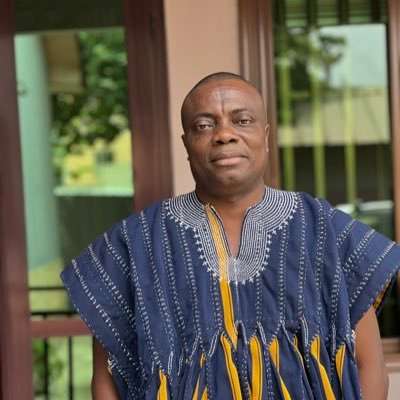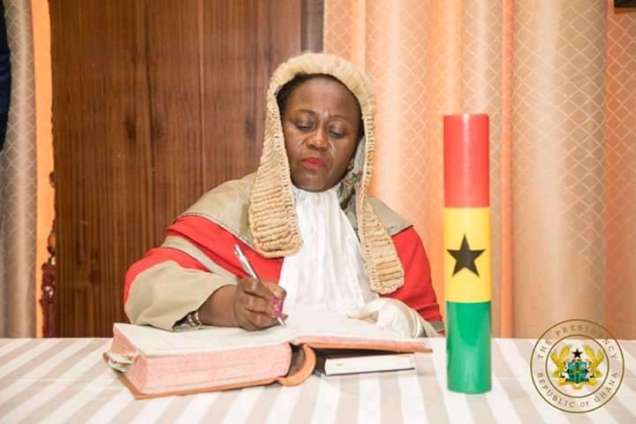The latest Chief Justice poll conducted by Global InfoAnalytics has ignited a firestorm, drawing sharp rebuke from New Patriotic Party (NPP) sympathizer and policy analyst Patrick Kwarteng Sarpong.
In a strongly worded critique, Sarpong blasted the think tank’s Executive Director, Mussa Dankwah, for what he describes as a misguided and politically motivated attempt to assess the popularity of Ghana’s Chief Justice, Gertrude Torkornoo.
According to Sarpong, the very idea of polling public opinion on whether the Chief Justice should remain in office is fundamentally flawed.
He argued that the office of the Chief Justice cannot be subjected to the same standards of public approval as politicians who are voted into office.
“The office of the Chief Justice is not an electable one for you to supposedly conduct a poll to ascertain whether she should be in office or not.”
Patrick Kwarteng Sarpong
Sarpong insisted that Chief Justice Torkornoo’s rise to the apex of the judiciary was based on merit and institutional progression—not a popularity contest.
He took particular exception to the notion that public likability should determine the tenure of a judicial officer, calling it both absurd and disrespectful.
“Gertrude Torkornoo did not go for any elections; for that reason, her fate should [not] be determined by her likability or otherwise by the masses. She got to her position through the ranks and not through any voting system, for you to waste our time with your fake survey on her.”
Patrick Kwarteng Sarpong
Sarpong went beyond challenging the reasoning behind the Chief Justice poll—he cast doubt on its credibility.

He accused Mussa Dankwah of leveraging the modest reputation Global InfoAnalytics earned from the 2024 elections—when their projections closely matched the final results—to now advance a politically motivated agenda.
In a tone laced with sarcasm, he implied that Dankwah was using that perceived accuracy as cover for pushing partisan narratives.
He alleged that Dankwah is now leveraging that post-election visibility to front a “paid agenda by your people, Mahama and his team.”
Sarpong also took issue with the methodology behind the survey, expressing disbelief that a sample of 2,500 phone respondents could be used to make sweeping conclusions about national sentiment.
“We do not believe in this survey. You phoned 2500 and used their responses to make a conclusive statement that more Ghanaians don’t want the CJ to be in place than those who want her to continue.”
Patrick Kwarteng Sarpong
Accordingly, he emphasized that such extrapolations were not only statistically questionable but politically motivated.
Poll Slammed As Agenda-Driven
Taking a closer look, Patrick Sarpong questioned the very relevance of conducting a poll on the Chief Justice’s removal, especially from the perspective of the average Ghanaian.
He argued that issues surrounding the judiciary, while important, do not resonate with the broader public in the same way as pressing concerns like unemployment, inflation, or healthcare.

“If you [Dankwah] care to know, many Ghanaians care very little about issues to do with a Chief Justice because their activities have little implications on their lives. We reject this fake survey!”
Patrick Kwarteng Sarpong
Using a sharp analogy, Sarpong flipped the logic behind the poll by drawing comparisons to President John Dramani Mahama.
“Ghanaians don’t like John Dramani Mahama now and have regretted voting for him. Does it mean that he should be forcibly removed from office because they don’t see him to be worthy enough to continue as president, assuming your survey is to be believed?”
Patrick Kwarteng Sarpong
His remarks reflect broader concerns about the increasingly politicized role that data and public opinion polls are beginning to play in Ghana’s governance discourse.

While polls can offer valuable insights into public sentiment, critics like Sarpong argue that their misuse can also distort democratic processes, especially when they target non-political figures like judges.
Meanwhile, Mussa Dankwah clarified that the poll, though reflective of public opinion on the Chief Justice, holds no bearing on the outcome of the petition for her removal.
Countering Sarpong’s argument, he emphasized that the poll is not meant to determine the Chief Justice’s fate.
Rather, it captures prevailing public sentiment about the judiciary, particularly the Supreme Court, which he noted has suffered a significant perception deficit.
According to Dankwah, such negative public perception inevitably impacts the credibility of anyone at the helm of the judiciary.
READ ALSO: GSE Trims Earlier Losses



















